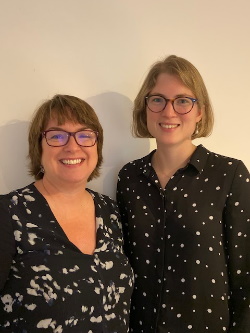Registration
The seminar is open to all and free of charge. The deadline for registration is 31 October. Please register through the registration form.
You are welcome to bring your lunch to the seminar.
About the presenters
Courtenay Norbury is a professor of Developmental Language & Communication Disorders at UCL, founding member of Raise Awareness of Developmental Language Disorder (RADLD) and professor II at Department of Special Needs Education, UiO. Her

research focuses on the overlaps between language, cognition, and social interaction across a range of neurodevelopmental conditions.
Sarah Griffiths is a research associate at UCL, working on the project The Surrey Communication and Language in Education Study (SCALES). The study is the first UK population study of language development and disorder at school entry. She completed her PhD at the University of Bristol with Marcus Munafo and Chris Jarrold. Her PhD research focused on emotion recognition in children with autism. She is particularly interested in understanding links between language, emotion processing and mental health in young people with neurodevelopmental conditions.
Abstracts
Courtenay Norbury : Experiences from the CATALISE consortium
Developmental Language Disorder (DLD) is the new term to replace Specific Language Impairment (SLI). Developmental Language Disorder is diagnosed when children fail to acquire their own language for no obvious reason. In the CATALISE study the goal was to use an online Delphi technique to see whether it was possible to achieve consensus among professionals on appropriate criteria for identifying children who might benefit from specialist services. A panel of experts representing ten disciplines from English-speaking countries was recruited to develop a definition of the disorder. Prof Norbury contributed to the CATALISE consortium, and will in her presentation describe the process of getting consensus on DLD terminology and diagnostic criteria, the key issues that arose, and how services can best address these issues.
Sarah Griffiths: Longitudinal associations between language competence and emotion recognition and regulation skills in children with and without Developmental Language Disorder
Children with Developmental Language Disorder (DLD) are at increased risk of social, emotional and behavioural problems in adolescence. In this talk, Sarah Griffiths will present data from a longitudinal study exploring whether deficits in emotion recognition and regulation could provide a causal mechanism to explain links between language and these mental health outcomes. The study found that Children with DLD can have difficulties developing emotion recognition skills and have trouble engaging in emotion regulation strategies that involve self-talk. This raises the possibility that emotion processing may partially mediate the relationship between poor language and poor mental health outcomes.
Welcome!

